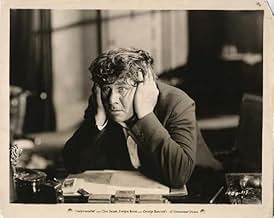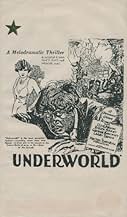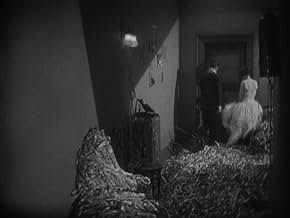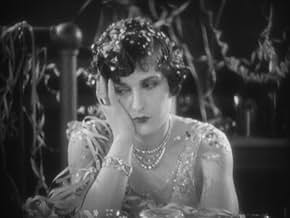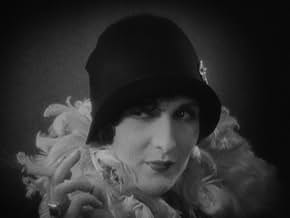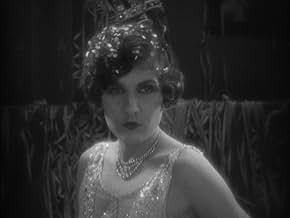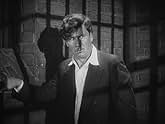Weed es un asaltante que tiene por única virtud el coraje. Wensel es un abogado talentoso, pero sumido en el alcoholismo. Una noche, tras un atraco, los dos se encuentran en medio de una cal... Leer todoWeed es un asaltante que tiene por única virtud el coraje. Wensel es un abogado talentoso, pero sumido en el alcoholismo. Una noche, tras un atraco, los dos se encuentran en medio de una calle, y la amistad nacerá entre ambos.Weed es un asaltante que tiene por única virtud el coraje. Wensel es un abogado talentoso, pero sumido en el alcoholismo. Una noche, tras un atraco, los dos se encuentran en medio de una calle, y la amistad nacerá entre ambos.
- Dirección
- Guión
- Reparto principal
- Ganó 1 premio Óscar
- 5 premios en total
- Judge
- (sin acreditar)
- Street Kid
- (sin acreditar)
- One of Laughing Faces at the Ball
- (sin acreditar)
- Laughing Woman at the Ball
- (sin acreditar)
- 'High Collar' Sam
- (sin acreditar)
- Detective at Railroad Station
- (sin acreditar)
- One of Buck's Henchmen
- (sin acreditar)
Reseñas destacadas
As said, 'Underworld' is a very good film. It is not one of Sternberg's best, do prefer the likes of 'Shanghai Empress', 'The Blue Angel', 'The Scarlet Empress' and 'The Devil is a Woman'. It is incredible though that this is only his third solo film, well technically the fifth but two are lost, and his distinctive style seemed not only obvious throughout but fully established, one does not usually that with directors at this early a stage, so 'Underworld' was something of an achievement.
Is 'Underworld' perfect? No as two scenes didn't quite work for me. One was the prison break sequence, which lacked the necessary tension and felt choppily staged.
The other was the ending, after the exciting shoot out it then ends on a tacked on note that is too at odds with what came before and came over as a little heavy-handed as well.
Sternberg's direction though is truly impressive, one does not expect to see direction this polished, visually beautiful or taut at such an early career stage suggestive of a director who had actually been in the profession for years beforehand (that's a compliment by the way). What immediately stands out is the production values, the settings are evocatively seedy yet made oddly attractive at the same time and the cinematography has great audacious style and gritty atmosphere. Sternberg's films always had great use of light and shadow and 'Underworld' is no exception. The music is suitably haunting.
Other than two scenes, the story was riveting with a suitably pull no punches atmosphere, some exciting moments (especially the climactic shoot-out, which is why it's a shame that how it's resolved disappoints) and some nice turns that stopped it from becoming predictable without it becoming confusing. The central relationship to me was handled fine. The performances likewise, with Bancroft showing again with his intensity that he is deserving of more credit. Clive Brook shows here how his acting grew significantly from when he first started and Evelyn Brent is charming.
Concluding, very good. 8/10
But while the initial premise may benefit from join-the-dots attraction, it is the performances and execution of the film that give it its power. All three principals do an outstanding job. Clive Brooks, as the educated man brought low by drink and redeemed by the casual generosity of a gangster, makes use of every shading of expression in a sensitive face, conveying more with fewer words in one glance than anyone else in the cast. His scenes with 'Feathers' are a tour-de-force. Despite his reticence, it's easy to credit that he is not only the most intelligent but - with the ironic vulnerability of the civilised man amidst those who live by tooth and claw - the most idealistic character in the film. Having thrown his lot in with criminals, he does the best he can to keep faith; but his eyes betray everything he cannot say.
Evelyn Brent has perhaps the hardest task, that of raising the moll 'Feathers' into more than just an object of general desire and appendage to her man. From her very first scenes - where she publicly adjusts her garter beneath the thigh-skimming hem of her dress - she radiates allure. But she also comes across as more perceptive and quick than her consort, and far more collected and self-contained. It's not hard to understand her roving eye when she meets a man more intriguing than Bull Weed, the jovial vulgarian who maintains her in the lap of luxury; but it is to the credit of George Bancroft, as 'Bull Weed', that we also sympathies with her reluctance to leave her protector in the lurch when she has the chance.
My admiration for Bancroft's acting gradually increased throughout the film. At the beginning he comes across as little better than a ham, gesturing over-widely and falling into uproarious laughter that is a little too loud and a little too long. But as time progresses it becomes evident that it is not the actor but the gangster himself who is playing a larger-than-life role, and when Bull Weed's defences slip we start to see the limited, confused man behind the act. Striding drunkenly for revenge, he transcends his humanity to become a lurching, elemental force. In court he shrinks to an uncomprehending ox of a man, all swagger gone. And finally, in perhaps Bancroft's finest achievement of all, with no audience left to play to but the shadows, Bull Weed in his betrayal becomes merely human, sinking back into the pretension-free gutter from which he must once have climbed. His last scenes carry a conviction and depth of character on which the success of the film ultimately rests, and which would have been all but unthinkable at the start.
Besides all this, the film itself is quite simply beautiful; beautifully made, beautifully lit, beautifully shot. It's no wonder that it was a smash hit by word of mouth, nor that it still stands up today, where the use of cruder sentiment or melodrama might long since have reduced it to the status of mere historical curiosity.
In a gangster film this lesson is expressed in one of two ways; the protagonist is either left a broken, doomed being whose tragic fate is envied by no one, or is purged in the fire and brimstone of a final violence. So although we have watched secretly fascinated at the social fabric in ruins, it is important, in both respects, that we leave the theater restored in ethical order. We thus assume the role of the despised public enemy; his fate is ours for having indulged the antisocial fantasy. The final taste is always gingerly bitter, and works when it does because we invested so much of ourselves in the wrong side of the fence.
So you may hear of this as a milestone in the evolution of this type of film, and it's all because of the finale. It is this cathartic vision of some urban mid-station on the road to limbo where, amid a pall of gunsmoke and broken shards of brick wall, our protagonist comes to realize folly and is purged from life almost as a hero.
It is important to note that he doesn't go out all guns blazing, but rather surrenders to the cops. He will face death, but will not be even momentarily martyred on screen; what is heroic about him, so properly old fashioned, is that he honorably extricates from his bloody fate the innocent.
You can't miss any of this if you're a fan of the gangster genre. Scarface - the original - was built on this.
There are a few other instances that exert some cinematic intrigue; the fast-cutting of faces, superimpositions, shadows across walls. But it does not match the more interesting experiments going on in silent cinema of the time, or what this man would be doing the following year.
What is so apt about all of this is the smoky, drowsily anxious mood, the sense of excited weariness at the prospect of danger. There is a brawl in what only 30 years before would have been called a saloon. It's called the 'Dreamland Cafe', and just outside a neon sign reading 'The City is Yours' flashes the grinning mobster and his moll.
Not to worry. This is a great film, one of the best prohibition-era gangster films I've seen, ranking slightly ahead of Little Caesar and the Public Enemy, and maybe only slightly below Scarface (1932). Tough, tense, tightly written--interestingly, Howard Hawks is credited for the scenario--and with gorgeous DARK cinematography and Josef von Sternberg's usual excellence in direction. I barely missed the lack of gangster-speak.
I suppose this film was a template upon which a lot of gangster films were based. It struck me while watching it how much it had in common with the Coen brothers' Miller's Crossing (1990)--a love triangle between a mob boss, his moll, and his right hand man. And it's all about the gangsters' peculiar code of ethics.
I'd rate it a perfect 10, but for a muddled and badly-handled prison break sequence, which I watched three times and still couldn't figure out. Maybe I'm just dense; maybe it was actually a genius bit of filmmaking and it just flew over my head, but for now, 9/10.
¿Sabías que...?
- CuriosidadesThe film was predicted to be a flop, was shelved by Paramount and eventually released in only one theater in New York. Screenwriter Ben Hecht demanded that his name was taken off the credits. As a result of strong word-of-mouth the movie became an enormous hit and won Hecht the first of his two Academy Awards.
- Citas
'Bull' Weed: -There was something I had to find out - - and that hour was worth more to me than my whole life.
- ConexionesFeatured in The House That Shadows Built (1931)
Selecciones populares
- How long is Underworld?Con tecnología de Alexa
Detalles
Taquilla
- Recaudación en Estados Unidos y Canadá
- 1.642.194 US$
- Duración1 hora 20 minutos
- Mezcla de sonido
- Relación de aspecto
- 1.33 : 1

